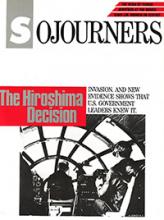Two days earlier, on Pentecost evening, we had gathered at the National Shrine of the Immaculate Conception in Washington, D.C., to call forth and to celebrate, with great fanfare, the coming of the Spirit. But on this Tuesday morning, this "Day of Christian Resistance," it was the Spirit who called to us.
For three days, during the Peace Pentecost 1985 conference, we had been affirming, claiming, and encouraging "The Rise of Christian Conscience." But on this momentous morning, as more than 1,000 of us gathered for a special worship service, the conscience we had validated with countless words rose anew and broke beyond the bounds of our feeble human reasoning. In the vibrant warmth of Washington's Metropolitan A.M.E. Church, this conscience overflowed our hearts and took on the form and life of the Spirit.
Throughout the conference, an ensemble of Sojourners vocalists had been performing songs of hope and life from South Africa. They opened this worship service with the same song they had sung to begin the conference: "Oh, freedom, freedom is coming. Freedom is coming. Oh, yes I know."
On the last note of the song, the audience exploded in a tumultuous burst of spirit and emotion. Within seconds, the entire assembly was on its feet, clapping and cheering. Shouts of "Freedom is coming!" "Jesus is coming," and "Yes!" filled the sanctuary for almost five minutes. We were ready.
We were ready for justice to roll down like waters. We were ready to proclaim freedom for the poor, for the oppressed in Central America, for those held hostage by nuclear weapons, for the suffering blacks in South Africa, for the unborn and for women, for the people of Afghanistan, and for those languishing on death rows.
Read the Full Article

